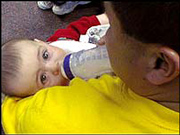![]()
One in 25 fathers 'not the daddy'
Up to one in 25 dads could unknowingly be raising another man's child, UK health researchers estimate.
BBC, U.K., August 10, 2005
Increasing use of genetic testing for medical and legal reasons means more couples are discovering the biological proof of who fathered the child.

The Liverpool John Moores University team reached its estimate based on research findings published between 1950 and 2004.
The study appears in the Journal of Epidemiology and Community Health.
Biological father
Professor Mark Bellis and his team said that the implications of so-called paternal discrepancy were huge and largely ignored, even though the incidence was increasing.
In the US, the number of paternity tests increased from 142,000 in 1991 to 310,490 in 2001.
Demand for testing has grown by a factor of 10 in the last decade in the UK, according to University Diagnostics, Teddington.
The current level in the UK is somewhere between 8,900 and 20,000 tests per year.
About 5,000 of these tests are instigated at the demand of the Child Support Agency to resolve who should be paying child maintenance.
Others are done to investigate inherited health disorders and others for social reasons.
The Liverpool team found that rates of cases where a father was not the biological father of his child ranged from 1% in some studies to as much as 30%.
Experts have generally agreed that the rate is below 10%, with a 4% rate meaning that about one in 25 could be affected.
However, increasing use of genetic testing is likely to boost the rates of paternal discrepancy, say the authors.
Important consequences
Professor Bellis said the consequences of a man finding out that he is not the biological father of a child could be devastating.
It can lead to relationship breakdown, mental health problems for both partners and even domestic violence, while the children involved can experience low self-esteem and anxiety.
He said services and support should be available to minimise such negative consequences.
However, even basic counselling is not always provided - some individuals order and receive test results by email or over a web site, he said.
"Vital information is being delivered to people without very much thought about how it is going to affect them," he said.
Counselling
Rebecca Webster, a counsellor for private paternity testing company DNA Bioscience, who speaks to about 500 men each month about such decisions, said: "We will raise the issue about whether they have thought about the consequences both for them and all those involved.
"Very often they are quite distressed and they want someone to talk to.
"By the time they get the results a lot of people have prepared themselves. But it's a very emotional process, even if the result is the one they wanted.
"In an ideal world, everyone should have counselling and it should be available on the NHS. Unfortunately, it's not."
Adrienne Burgess of Fathers Direct called for a code of practice to ensure companies providing paternity tests also offer counselling.
The NSPCC said fathers who find out they have been raising another man's child should remember that however angry they feel, they should not take this out on the child in any way.
"The child will still regard the parent as their father. Rejection could be a devastating double blow for the child, " said a spokeswoman.

